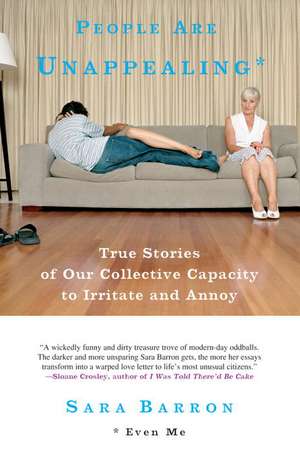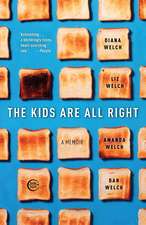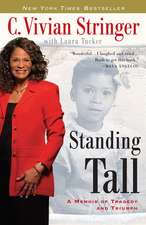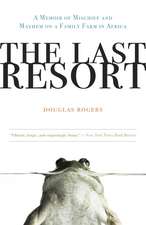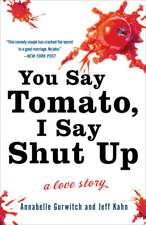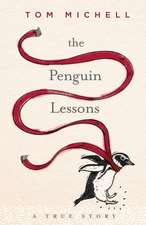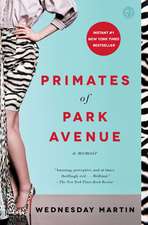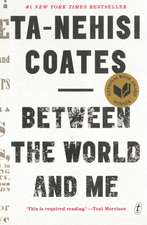People Are Unappealing: True Stories of Our Collective Capacity to Irritate and Annoy
Autor Sara Barronen Limba Engleză Paperback – 28 feb 2009
People Are Unappealing tells the strange, funny, and sometimes filthy stories of Sara Barron’s twisted suburban upbringing and deranged attempt at taking the Big Apple by stormߝfirst as an actor (then a waiter), then a dancer (then a waiter), then a comic (then a waiter). It’s there that she meets the ex-boyfriend turned street clown. The silk pajama-clad poet. The OCD Xanax addict who refuses to have sex wearing any fewer than three condoms.
Barron has a knack for attracting the unattractive. People Are Unappealing is her wickedly funny look at the dark side of humanity.
Preț: 108.42 lei
Nou
Puncte Express: 163
Preț estimativ în valută:
20.75€ • 21.53$ • 17.34£
20.75€ • 21.53$ • 17.34£
Carte disponibilă
Livrare economică 24 februarie-10 martie
Preluare comenzi: 021 569.72.76
Specificații
ISBN-13: 9780307382450
ISBN-10: 0307382451
Pagini: 223
Dimensiuni: 133 x 203 x 12 mm
Greutate: 0.16 kg
Editura: Three Rivers Press (CA)
ISBN-10: 0307382451
Pagini: 223
Dimensiuni: 133 x 203 x 12 mm
Greutate: 0.16 kg
Editura: Three Rivers Press (CA)
Notă biografică
SARA BARRON’s work has appeared on Showtime’s This American Life, National Public Radio’s Weekend Edition, and the Today show and at the HBO Comedy Festival in Aspen, Colorado. She lives in Brooklyn, New York. This is her first book.
Extras
1
Lady daddy
I've always preferred sedentary activities to active activities. In my tweenage years, I shirked anything labeled "extracurricular" for the chance to head home after school and sit locked in the bathroom. I preferred the bathroom to my bedroom because it had a lock on the door for much-needed privacy, and I'd spend my time there alternately cramming the ambiguous genitalia of my Barbie and Ken dolls together and interviewing myself about my imagined acting career. Pretending an electric toothbrush was a microphone, I'd ask, "What's it like being a movie star?"
"It's fun," I'd answer back. "Sometimes I have sex with John Stamos."
I'd sustain this clever banter until my father knocked on the door. My father is a creature of habit, so from Monday to Friday for eighteen years he arrived home from work at 5:32 p.m. First he'd set down his briefcase to file his nails, and then he'd "get lucky," to use the euphemism coined by my Metamucil addict of a mother. "What I wouldn't do for your father's small intestine," she says. "The man is blessed." He'd plan it this way since the use of public bathrooms always prompted his panicked descent into oblivion. "A person ought to be able to relax and enjoy himself," he'd say. "I like a little space, a little 'me' time. Is that so bizarre?"
So he'd oust me from the bathroom and I'd head downstairs to the living room, where he'd join me fifteen minutes later. "I feel like a new man!" he'd say, and then unwind with a bottle of blush wine and one of his many musical albums. By "musical albums" I do not mean, simply, albums. I'm not being redundant. I mean musical as in musicals: Marvin Hamlisch. Kander. Ebb. "Are you listening to this?!" he'd ask over the blare of the title song from Oklahoma! "Doesn't it just . . . gosh! I don't know . . . doesn't it make you want to dance?!" Then with the flourish of an imaginary cape, he'd twirl his hips in tight, concentric circles.
Usually it's a father who catches the seed of a lisp in his son or a talent for eyeballing another man's inseam, and he bristles with fear at the prospect of, to quote my next-door neighbor Brian, whose childhood pillowcases were sewn from tattered Confederate flags, "some gay shit." That my father could recite the entire oeuvre of Rodgers and Hammerstein, that his sock drawer was flecked with freesia potpourri, forced my younger brother, Sam, into the reverse situation.
"Sometimes Daddy's like a lady," Sam would say.
This was true. But it didn't faze me. On the contrary, my dad's offbeat behavior left me feeling optimistic. "At least if Dad's gay," I pointed out, "he's not doing Mom."
My mother, in a pair of heels with her hair teased, has a good eight inches on my dad. Size-wise, they look like Golden Girls Bea Arthur and Estelle Getty respectively, a resemblance emphasized by my mother's affection for tunics and my father's clothing staple, a shapeless, taupe cardigan. Parents and sex is an unhappy combination for most, and with their atypical height discrepancy and fashion taste of Floridian retirees, I've always found the notion especially upsetting. If they weren't having sex--and if my father's weak wrists and sibilant s were to blame--it was no skin off my back. My parents were among the few still married in our Jewish suburb of Chicago, and while in later years I'd come to appreciate this fact, when I was young, the notion of divorced parents struck me as chic. Very now. The possibility of two separate homes seemed wonderfully decadent, and I wished for divorce in the hope that one of them might land someone with a heated pool.
"You should've seen the way Dad was eyeing Dr. Cohen," I'd tell my mom after a father-daughter visit to the dentist. "He kept saying how much he liked his tie. Then his shoes. It was . . . I don't know . . . weird."
"Nice try," she'd say. "Your dad's not doing Dr. Cohen."
Elsewhere, a father of questionable sexual orientation cripples a family into silence. But not us. Father: gay-seeming. Mother: psychotherapist. This is the woman who coined the phrase "Don't repress, instead express!" So we discussed it over dinner, the conversation underscored by the '70s Broadway blockbuster A Chorus Line.
"Listen to the lyrics," instructed my father. "It's a song about chasing your dreams. I hope you both chase your dreams." Then his eyes would glass over.
"Dad's a homo!" Sam would shout. "He cries like a homo!"
"Your father's not gay," my mother chimed in. "He's effeminate."
"Oh, I'm gay!" my father countered. "Who here knows what gay really means?"
He writes dictionary definitions for a living, my father. Never in your life have you met someone more enthused about alternate meanings.
"Homo!" Sam shouted.
"And?"
"Happy," my mother offered. "Your father's happy and effeminate."
Effeminate? Yes. Happy? Debatable. His affinity for losing himself in the canon of American show tunes and drowning what remained of the day in bottles of blush wine didn't scream "happy!" or "fulfilled!" Here was a man who'd endured great sacrifice. His childhood ambition had been to be the next Edith Piaf. The morphine addiction and untimely death weren't of interest. "But my goodness!" he'd say in later years as he hummed a tune about a swarthy French cadet. "What a voice! What charisma!" He spent years studying her lyrics and emotive performance style but was forced to abandon the dream once he married my mother.
"Oh no," she told him. "Not on my time, you don't. You pack up the records and brandy snifter and you go find yourself a real job."
Like a hospice worker unperturbed if her kid gets the flu, my mother the therapist was none too moved by the average emotional trauma. You spend your days regaled with stories of molestation, battery, and molestation and battery, and your skin grows thick. You don't worry yourself if you crush a grown man's dream of being Edith Piaf. "Up by the bootstraps," you tell him, and--as marriage must be built on compromise--you shut your mouth when he encourages your children to reenact Miss Saigon in the backyard.
When someone asked if she found my father's atypically ladylike ways at all disturbing, my mother, unconcerned, would say, "Joe is a wonderful husband and father," and then, to put such people in their place for having had the nerve to pry, she'd add, "and he's more regular than a billboard on a highway! He's to be envied and admired!"
My parents' utter lack of defensiveness is the best reason I can give as to why I do believe my father's straight. I stand behind that age-old slogan "The One Who Smelt It Dealt It." I believe the repressed homosexuals of the world are too busy Bible thumping and slinging words like "fag" around to be entranced by South Pacific.
Upon my eleventh birthday and junior high school entree, my father predictably insisted that I audition for the school musical.
"Just think of it!" he cooed. "The smell of the greasepaint! The roar of the crowd!"
Up until that point I had, as previously mentioned, harbored an aversion to extracurricular activities, preferring instead to hang out in my bathroom with my Barbie dolls or on the living room couch eating loaves of bread. Despite these natural inclinations, my father had intermittently tried to engage me in different "fun" projects. Would I like to learn to ride a bike? To swim? Perhaps it would amuse me to play Maria to his Mother Abbess? But I declined each offer, preferring instead to read a Harlequin romance or, in later years, masturbate. But the school musical suggestion did pique my interest. It was the bit about the "roaring" crowd that did it. My father's passion had instilled in me not only a knowledge of musical theater, but also a desire to be on stage or screen myself. It was true I lacked a decent singing voice, but I compensated for this disadvantage with an uncanny ability to mimic Tina Turner's dancing. Call it what you will--luck? the grace of god?--I knew it earned me the right to an audience. I always assumed my singing could improve with practice, and in the meantime, I'd wow a crowd with a hair toss to "Proud Mary." During my aforementioned on-toilet interviews of myself by myself, I'd pose questions regarding this wide array of talents.
"Ms. Barron," I'd say into the electric toothbrush, "what's it like to be so young and so accomplished?"
Then I'd smile politely, feigning discomfort at this limelight thrust upon me. "I've been so very blessed," I'd say. "God gave me this talent. Now it's my job to share it with the world."
A stage seemed preferable to a porcelain bowl if we're talking decent platforms for attracting attention to oneself, so I decided to give it a shot. I told my father I'd audition, "But only if you'll buy me a microphone."
"Absolutely not," shouted my mother, who'd overheard the conversation from the kitchen. "We do not reward with material goods in this family."
My father shrugged. The only thing he loved more than musical theater was avoiding conflict with my mother.
"You heard the woman!" he shouted back for her benefit. But then, to me, he whispered, "How's about I promise you the microphone for Hanukkah instead?"
"Deal," I said.
"Deal," he said. "Just promise not to tell your mother."
The show was Guys and Dolls, and I auditioned in a Bart Simpson T-shirt tucked into gym shorts, performing an a cappella rendition of the up-tempo but soulful "Chain of Fools." I landed the role of Sakiko. Sakiko? you're thinking. In Guys and Dolls? Yes. If you blink, you miss her, but she's there in the show's opening Times Square montage. In the movie version, she appears as a tourist more Hawaiian than Asian, draped in leis and a floral-pattern dress, in a shtick most aptly described as "The City Is Big and Confusing! I Like to Laugh!"
As someone pinkish and pale and covered in moles, someone once told by a Bulgarian dry cleaner that I had hair "like that of belonging to the nest of birds. Yes! Nests of the stork!" I can say with great certainty: I do not look Asian. I do not look maybe Asian. My associations to the continent are limited to the facts that in avoidance of processed carbs, I eat a lot of sashimi, and that in the early '00s I got a case of HPV from a Vietnamese sculptor I'd been dating named Quong. But that's it. And as a result, Sakiko and I seemed an unlikely pair. She wasn't at all what I'd had in mind when I auditioned. At the very least, I'd hoped for a dance solo: a box step or grapevine performed with a line of chorus girls behind me. But Sakiko? Shuffling along and laughing like an asshole at a painted-on-burlap version of the Chrysler Building? No, thank you.
When my father arrived home from work later that night, he could smell my disappointment. He's astute that way, sensitive to others. I broke the news of Sakiko, Asian Tourist #2, and he tried desperately to comfort me. "Oh now, honey," he'd said. "Don't be disappointed! You know, there's an old saying in the theater that goes, 'There are no small parts. Just small actors.'"
"Who thought that up?" asked my mom.
"I don't know who exactly," he answered. "It's just a thing that people say."
"Well, it sounds like crap to me. Crap drummed up by someone repressing his anger. Sara"--she turned to me--"if you'd rather spend your afternoons on the toilet talking to yourself about . . ."
"My future in showbiz."
"Fine. Your 'future in showbiz.' If you'd rather do that than this Sakiko thing, you be my guest." She fluffed her hair, threw on a poncho, and looked at her watch. "Oy!" she cried. "I'm late. I have a six o'clock appointment with a client who's terrified of--get this--goats!"
I appreciated her support even though I knew it stemmed less from an interest in encouraging my natural talents and more from her need to save money. My mother is shockingly frugal--her idea of "treating herself" involves the purchase of brand-name stool softener--and the moment I handed over a costume list that read "leotard, chopsticks, kimono," she got angry.
"This is absurd!" she shouted. "Do these teachers think parents have kimonos and leotards just lying around? I'm not shelling out my hard-earned money so my daughter can look Asian for a two-night run of Guys and Dolls!"
Spending money goes against her natural instincts. But rather than sling a word like cheap or Jew around, I try to focus on the nobility inherent in her habit. Our suburb teemed with wealth--Range Rovers, uptalk, I knew a dog with a masseuse--and all she wanted was to keep her children grounded. Sam and I were kept on close watch lest we develop a taste for life's finer aspects.
"First you want a microphone for god-knows-what, then it's a pony, then the next thing you know, you'll need a goddamn maid to wipe your ass!"
I didn't think a microphone was the first step on the road to incompetence. But my mother begged to differ. On this purchase, on every other. Normally I viewed her refusals as the chance to sulk or slam a door, but this time it was cause for celebration. No kimono? No Sakiko.
"Oh well," I told my dad once my mother left for work. "So I guess I'll just drop out? I think it's no big deal? Since the rehearsals haven't started yet?" I swung up the end of every sentence and nodded my head yes in a subtle suggestion, a secular prayer: Please. Don't make me go. Let me stay at home instead dueting with my brother bits of Cats for your amusement. Let me lie prostrate on the couch, a loaf of French bread in my mouth.
"Now that sounds like a quitter talking!" my father answered back. "Not a showbiz starlet headed to the top." He paced around the room before turning to face my brother and me. "Who here knows what the word resourceful means?"
I sighed and Sam passed gas.
"Excuse you," said my father. "Resourceful means inventive. Or clever. It means that we can pull a costume together even if we can't spend money. We can be . . . resourceful!"
Too lazy to battle my father's enthusiasm, I followed him to my mother's closet, where he found a floor-length silk robe--"Voila: kimono!" he squealed--and a sea horse-spattered bathing suit from 1985. "Well, well, well," he said. "It looks like we've found ourselves a leotard."
We ordered Chinese food that night so I'd have a pair of chopsticks. Having finished the meal, my father lathered his set in the sink, then laid them down to dry in the dish rack.
Lady daddy
I've always preferred sedentary activities to active activities. In my tweenage years, I shirked anything labeled "extracurricular" for the chance to head home after school and sit locked in the bathroom. I preferred the bathroom to my bedroom because it had a lock on the door for much-needed privacy, and I'd spend my time there alternately cramming the ambiguous genitalia of my Barbie and Ken dolls together and interviewing myself about my imagined acting career. Pretending an electric toothbrush was a microphone, I'd ask, "What's it like being a movie star?"
"It's fun," I'd answer back. "Sometimes I have sex with John Stamos."
I'd sustain this clever banter until my father knocked on the door. My father is a creature of habit, so from Monday to Friday for eighteen years he arrived home from work at 5:32 p.m. First he'd set down his briefcase to file his nails, and then he'd "get lucky," to use the euphemism coined by my Metamucil addict of a mother. "What I wouldn't do for your father's small intestine," she says. "The man is blessed." He'd plan it this way since the use of public bathrooms always prompted his panicked descent into oblivion. "A person ought to be able to relax and enjoy himself," he'd say. "I like a little space, a little 'me' time. Is that so bizarre?"
So he'd oust me from the bathroom and I'd head downstairs to the living room, where he'd join me fifteen minutes later. "I feel like a new man!" he'd say, and then unwind with a bottle of blush wine and one of his many musical albums. By "musical albums" I do not mean, simply, albums. I'm not being redundant. I mean musical as in musicals: Marvin Hamlisch. Kander. Ebb. "Are you listening to this?!" he'd ask over the blare of the title song from Oklahoma! "Doesn't it just . . . gosh! I don't know . . . doesn't it make you want to dance?!" Then with the flourish of an imaginary cape, he'd twirl his hips in tight, concentric circles.
Usually it's a father who catches the seed of a lisp in his son or a talent for eyeballing another man's inseam, and he bristles with fear at the prospect of, to quote my next-door neighbor Brian, whose childhood pillowcases were sewn from tattered Confederate flags, "some gay shit." That my father could recite the entire oeuvre of Rodgers and Hammerstein, that his sock drawer was flecked with freesia potpourri, forced my younger brother, Sam, into the reverse situation.
"Sometimes Daddy's like a lady," Sam would say.
This was true. But it didn't faze me. On the contrary, my dad's offbeat behavior left me feeling optimistic. "At least if Dad's gay," I pointed out, "he's not doing Mom."
My mother, in a pair of heels with her hair teased, has a good eight inches on my dad. Size-wise, they look like Golden Girls Bea Arthur and Estelle Getty respectively, a resemblance emphasized by my mother's affection for tunics and my father's clothing staple, a shapeless, taupe cardigan. Parents and sex is an unhappy combination for most, and with their atypical height discrepancy and fashion taste of Floridian retirees, I've always found the notion especially upsetting. If they weren't having sex--and if my father's weak wrists and sibilant s were to blame--it was no skin off my back. My parents were among the few still married in our Jewish suburb of Chicago, and while in later years I'd come to appreciate this fact, when I was young, the notion of divorced parents struck me as chic. Very now. The possibility of two separate homes seemed wonderfully decadent, and I wished for divorce in the hope that one of them might land someone with a heated pool.
"You should've seen the way Dad was eyeing Dr. Cohen," I'd tell my mom after a father-daughter visit to the dentist. "He kept saying how much he liked his tie. Then his shoes. It was . . . I don't know . . . weird."
"Nice try," she'd say. "Your dad's not doing Dr. Cohen."
Elsewhere, a father of questionable sexual orientation cripples a family into silence. But not us. Father: gay-seeming. Mother: psychotherapist. This is the woman who coined the phrase "Don't repress, instead express!" So we discussed it over dinner, the conversation underscored by the '70s Broadway blockbuster A Chorus Line.
"Listen to the lyrics," instructed my father. "It's a song about chasing your dreams. I hope you both chase your dreams." Then his eyes would glass over.
"Dad's a homo!" Sam would shout. "He cries like a homo!"
"Your father's not gay," my mother chimed in. "He's effeminate."
"Oh, I'm gay!" my father countered. "Who here knows what gay really means?"
He writes dictionary definitions for a living, my father. Never in your life have you met someone more enthused about alternate meanings.
"Homo!" Sam shouted.
"And?"
"Happy," my mother offered. "Your father's happy and effeminate."
Effeminate? Yes. Happy? Debatable. His affinity for losing himself in the canon of American show tunes and drowning what remained of the day in bottles of blush wine didn't scream "happy!" or "fulfilled!" Here was a man who'd endured great sacrifice. His childhood ambition had been to be the next Edith Piaf. The morphine addiction and untimely death weren't of interest. "But my goodness!" he'd say in later years as he hummed a tune about a swarthy French cadet. "What a voice! What charisma!" He spent years studying her lyrics and emotive performance style but was forced to abandon the dream once he married my mother.
"Oh no," she told him. "Not on my time, you don't. You pack up the records and brandy snifter and you go find yourself a real job."
Like a hospice worker unperturbed if her kid gets the flu, my mother the therapist was none too moved by the average emotional trauma. You spend your days regaled with stories of molestation, battery, and molestation and battery, and your skin grows thick. You don't worry yourself if you crush a grown man's dream of being Edith Piaf. "Up by the bootstraps," you tell him, and--as marriage must be built on compromise--you shut your mouth when he encourages your children to reenact Miss Saigon in the backyard.
When someone asked if she found my father's atypically ladylike ways at all disturbing, my mother, unconcerned, would say, "Joe is a wonderful husband and father," and then, to put such people in their place for having had the nerve to pry, she'd add, "and he's more regular than a billboard on a highway! He's to be envied and admired!"
My parents' utter lack of defensiveness is the best reason I can give as to why I do believe my father's straight. I stand behind that age-old slogan "The One Who Smelt It Dealt It." I believe the repressed homosexuals of the world are too busy Bible thumping and slinging words like "fag" around to be entranced by South Pacific.
Upon my eleventh birthday and junior high school entree, my father predictably insisted that I audition for the school musical.
"Just think of it!" he cooed. "The smell of the greasepaint! The roar of the crowd!"
Up until that point I had, as previously mentioned, harbored an aversion to extracurricular activities, preferring instead to hang out in my bathroom with my Barbie dolls or on the living room couch eating loaves of bread. Despite these natural inclinations, my father had intermittently tried to engage me in different "fun" projects. Would I like to learn to ride a bike? To swim? Perhaps it would amuse me to play Maria to his Mother Abbess? But I declined each offer, preferring instead to read a Harlequin romance or, in later years, masturbate. But the school musical suggestion did pique my interest. It was the bit about the "roaring" crowd that did it. My father's passion had instilled in me not only a knowledge of musical theater, but also a desire to be on stage or screen myself. It was true I lacked a decent singing voice, but I compensated for this disadvantage with an uncanny ability to mimic Tina Turner's dancing. Call it what you will--luck? the grace of god?--I knew it earned me the right to an audience. I always assumed my singing could improve with practice, and in the meantime, I'd wow a crowd with a hair toss to "Proud Mary." During my aforementioned on-toilet interviews of myself by myself, I'd pose questions regarding this wide array of talents.
"Ms. Barron," I'd say into the electric toothbrush, "what's it like to be so young and so accomplished?"
Then I'd smile politely, feigning discomfort at this limelight thrust upon me. "I've been so very blessed," I'd say. "God gave me this talent. Now it's my job to share it with the world."
A stage seemed preferable to a porcelain bowl if we're talking decent platforms for attracting attention to oneself, so I decided to give it a shot. I told my father I'd audition, "But only if you'll buy me a microphone."
"Absolutely not," shouted my mother, who'd overheard the conversation from the kitchen. "We do not reward with material goods in this family."
My father shrugged. The only thing he loved more than musical theater was avoiding conflict with my mother.
"You heard the woman!" he shouted back for her benefit. But then, to me, he whispered, "How's about I promise you the microphone for Hanukkah instead?"
"Deal," I said.
"Deal," he said. "Just promise not to tell your mother."
The show was Guys and Dolls, and I auditioned in a Bart Simpson T-shirt tucked into gym shorts, performing an a cappella rendition of the up-tempo but soulful "Chain of Fools." I landed the role of Sakiko. Sakiko? you're thinking. In Guys and Dolls? Yes. If you blink, you miss her, but she's there in the show's opening Times Square montage. In the movie version, she appears as a tourist more Hawaiian than Asian, draped in leis and a floral-pattern dress, in a shtick most aptly described as "The City Is Big and Confusing! I Like to Laugh!"
As someone pinkish and pale and covered in moles, someone once told by a Bulgarian dry cleaner that I had hair "like that of belonging to the nest of birds. Yes! Nests of the stork!" I can say with great certainty: I do not look Asian. I do not look maybe Asian. My associations to the continent are limited to the facts that in avoidance of processed carbs, I eat a lot of sashimi, and that in the early '00s I got a case of HPV from a Vietnamese sculptor I'd been dating named Quong. But that's it. And as a result, Sakiko and I seemed an unlikely pair. She wasn't at all what I'd had in mind when I auditioned. At the very least, I'd hoped for a dance solo: a box step or grapevine performed with a line of chorus girls behind me. But Sakiko? Shuffling along and laughing like an asshole at a painted-on-burlap version of the Chrysler Building? No, thank you.
When my father arrived home from work later that night, he could smell my disappointment. He's astute that way, sensitive to others. I broke the news of Sakiko, Asian Tourist #2, and he tried desperately to comfort me. "Oh now, honey," he'd said. "Don't be disappointed! You know, there's an old saying in the theater that goes, 'There are no small parts. Just small actors.'"
"Who thought that up?" asked my mom.
"I don't know who exactly," he answered. "It's just a thing that people say."
"Well, it sounds like crap to me. Crap drummed up by someone repressing his anger. Sara"--she turned to me--"if you'd rather spend your afternoons on the toilet talking to yourself about . . ."
"My future in showbiz."
"Fine. Your 'future in showbiz.' If you'd rather do that than this Sakiko thing, you be my guest." She fluffed her hair, threw on a poncho, and looked at her watch. "Oy!" she cried. "I'm late. I have a six o'clock appointment with a client who's terrified of--get this--goats!"
I appreciated her support even though I knew it stemmed less from an interest in encouraging my natural talents and more from her need to save money. My mother is shockingly frugal--her idea of "treating herself" involves the purchase of brand-name stool softener--and the moment I handed over a costume list that read "leotard, chopsticks, kimono," she got angry.
"This is absurd!" she shouted. "Do these teachers think parents have kimonos and leotards just lying around? I'm not shelling out my hard-earned money so my daughter can look Asian for a two-night run of Guys and Dolls!"
Spending money goes against her natural instincts. But rather than sling a word like cheap or Jew around, I try to focus on the nobility inherent in her habit. Our suburb teemed with wealth--Range Rovers, uptalk, I knew a dog with a masseuse--and all she wanted was to keep her children grounded. Sam and I were kept on close watch lest we develop a taste for life's finer aspects.
"First you want a microphone for god-knows-what, then it's a pony, then the next thing you know, you'll need a goddamn maid to wipe your ass!"
I didn't think a microphone was the first step on the road to incompetence. But my mother begged to differ. On this purchase, on every other. Normally I viewed her refusals as the chance to sulk or slam a door, but this time it was cause for celebration. No kimono? No Sakiko.
"Oh well," I told my dad once my mother left for work. "So I guess I'll just drop out? I think it's no big deal? Since the rehearsals haven't started yet?" I swung up the end of every sentence and nodded my head yes in a subtle suggestion, a secular prayer: Please. Don't make me go. Let me stay at home instead dueting with my brother bits of Cats for your amusement. Let me lie prostrate on the couch, a loaf of French bread in my mouth.
"Now that sounds like a quitter talking!" my father answered back. "Not a showbiz starlet headed to the top." He paced around the room before turning to face my brother and me. "Who here knows what the word resourceful means?"
I sighed and Sam passed gas.
"Excuse you," said my father. "Resourceful means inventive. Or clever. It means that we can pull a costume together even if we can't spend money. We can be . . . resourceful!"
Too lazy to battle my father's enthusiasm, I followed him to my mother's closet, where he found a floor-length silk robe--"Voila: kimono!" he squealed--and a sea horse-spattered bathing suit from 1985. "Well, well, well," he said. "It looks like we've found ourselves a leotard."
We ordered Chinese food that night so I'd have a pair of chopsticks. Having finished the meal, my father lathered his set in the sink, then laid them down to dry in the dish rack.
Recenzii
“These days, the market is pretty well saturated when it comes to memoir. Which means it has to be good; it has to be different. Sara Barron's essays about her childhood, her parents, her life in acting school in Manhattan and her fellow actors are, dare we say it, as funny as David Sedaris'. . . . Barron swats these quirks around like a cat with a big, juicy catnip toy. When you aren't squirming, you're laughing out loud.”
—Los Angeles Times
“[W]hat happens to a bildungsroman in the Craigslist age. It follows the author on a mad-as-hell/not-taking-it-anymore complaining spree through the dregs of thankless, low-wage jobs. Along the way, Barron makes several keen observations about the strange things people do, and also manages to canonize John Stamos as ‘the most flawless man who has ever lived,’ which had to be done by somebody.”
—Gothamist
“Humorist and former Highland Park resident Sara Barron thinks many people, including her, are unappealing. Sexed-up college roommates, freaky online suitors, dads who know way too many show tunes -- they're all rib-ticklingly eviscerated in Barron's relentlessly self-deprecating new book, People Are Unappealing.”
—Chicago Sun-Times
“With People are Unappealing, a collection of hilarious personal essays, Sara Barron will attract comparisons to David Sedaris and Sloane Crosley. But anyone tempted to buy into that idea should know that Sedaris and Crosley come off as adorable children in Barron's presence.”
—Cleveland Plain Dealer
“Barron [is] a delightful combination of Saturday Night Live's Kristin Wiig and a frizzier-haired Lucille Ball.”
—Independent Weekly (Raleigh/Durham, NC)
“Sara Barron has written one of those books that force readers to make a choice: Either you’re willing to find the humor in a young Jewish woman talking about getting diarrhea after meeting John Stamos and suffering through Schindler’s List or you're not. For those willing to go on this adventure, welcome. Everybody else, please continue on to the ‘S’ section of the bookstore, where you'll find the milquetoast humor of David Sedaris, to whom Barron will undoubtedly be compared…. [S]he possess a good pen for breezy narrative and a well-tuned awareness of the line separating the everyday absurd from the entirely too-much-personal-information-to-share-in-your-out-loud-voice…, but even better is the shameless glee with which she crosses that line again and again and again and again.”
—Baltimore City Paper
“A wickedly funny and dirty treasure trove of modern-day oddballs. The darker and more unsparing Sara Barron gets, the more her essays transform into a warped love letter to life’s most unusual citizens.”
—Sloane Crosley, author of I Was Told There’d Be Cake
“With this smart and funny debut, Sara Barron establishes herself as the Michael Phelps of complaining.”
—Andy Borowitz, New Yorker contributor
“Truly a pee-inducingly hilarious book. . . . Unrelenting, fearlessly funny essays.”
—Mike Albo, author of The Underminer
“Fast, reckless, and precarious–an out-of-control tour bus careening though the horrors of Nerve.com dating and waitressing at the Olive Garden and bar-top dancing for NY rednecks: The ride will leave you reeling and breathless.”
—George Dawes Green, author of The Caveman’s Valentine
—Los Angeles Times
“[W]hat happens to a bildungsroman in the Craigslist age. It follows the author on a mad-as-hell/not-taking-it-anymore complaining spree through the dregs of thankless, low-wage jobs. Along the way, Barron makes several keen observations about the strange things people do, and also manages to canonize John Stamos as ‘the most flawless man who has ever lived,’ which had to be done by somebody.”
—Gothamist
“Humorist and former Highland Park resident Sara Barron thinks many people, including her, are unappealing. Sexed-up college roommates, freaky online suitors, dads who know way too many show tunes -- they're all rib-ticklingly eviscerated in Barron's relentlessly self-deprecating new book, People Are Unappealing.”
—Chicago Sun-Times
“With People are Unappealing, a collection of hilarious personal essays, Sara Barron will attract comparisons to David Sedaris and Sloane Crosley. But anyone tempted to buy into that idea should know that Sedaris and Crosley come off as adorable children in Barron's presence.”
—Cleveland Plain Dealer
“Barron [is] a delightful combination of Saturday Night Live's Kristin Wiig and a frizzier-haired Lucille Ball.”
—Independent Weekly (Raleigh/Durham, NC)
“Sara Barron has written one of those books that force readers to make a choice: Either you’re willing to find the humor in a young Jewish woman talking about getting diarrhea after meeting John Stamos and suffering through Schindler’s List or you're not. For those willing to go on this adventure, welcome. Everybody else, please continue on to the ‘S’ section of the bookstore, where you'll find the milquetoast humor of David Sedaris, to whom Barron will undoubtedly be compared…. [S]he possess a good pen for breezy narrative and a well-tuned awareness of the line separating the everyday absurd from the entirely too-much-personal-information-to-share-in-your-out-loud-voice…, but even better is the shameless glee with which she crosses that line again and again and again and again.”
—Baltimore City Paper
“A wickedly funny and dirty treasure trove of modern-day oddballs. The darker and more unsparing Sara Barron gets, the more her essays transform into a warped love letter to life’s most unusual citizens.”
—Sloane Crosley, author of I Was Told There’d Be Cake
“With this smart and funny debut, Sara Barron establishes herself as the Michael Phelps of complaining.”
—Andy Borowitz, New Yorker contributor
“Truly a pee-inducingly hilarious book. . . . Unrelenting, fearlessly funny essays.”
—Mike Albo, author of The Underminer
“Fast, reckless, and precarious–an out-of-control tour bus careening though the horrors of Nerve.com dating and waitressing at the Olive Garden and bar-top dancing for NY rednecks: The ride will leave you reeling and breathless.”
—George Dawes Green, author of The Caveman’s Valentine
